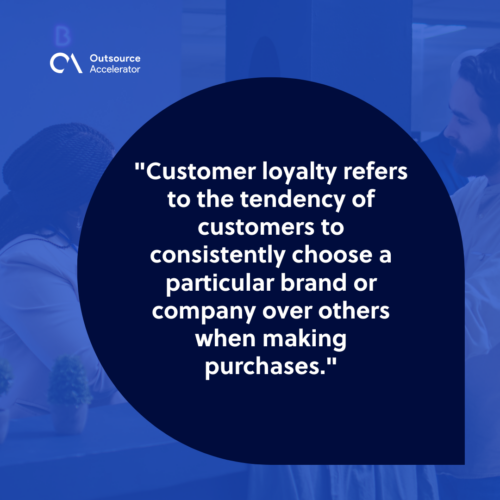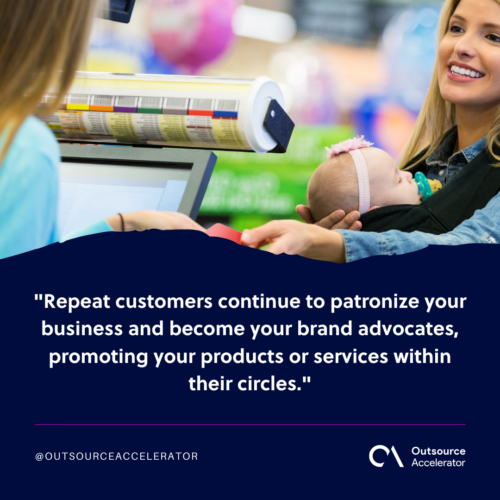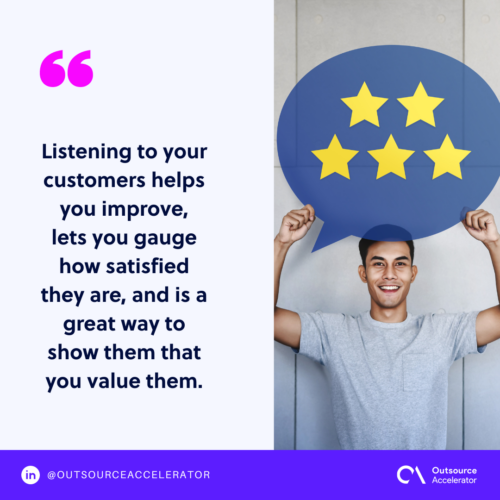How to build and attain customer loyalty

In a competitive market, retaining customers is often more cost-effective than acquiring new ones.
In fact, Bain & Company and Harvard Business School reveal that “increasing customer retention rates by 5% increases profits by 25% to 95%.“
The more loyal a customer is, the more likely they are to vouch for your business online or by word-of-mouth.
According to the 2018 Bond Brand Loyalty Report, 70% of consumers are likelier to endorse a brand with a good loyalty program. That’s essentially free marketing!
Here’s a comprehensive guide for business owners on how to not only build but also attain customer loyalty.
What is customer loyalty?
Customer loyalty refers to the tendency of customers to consistently choose a particular brand or company over others when making purchases.
It goes beyond one-off transactions and implies a deep and sustained relationship between the customer and the business.
Repeat buyers are your most valuable customers, and the most loyal customers are often those who feel emotionally connected to a brand.

Why is customer loyalty important?
Customer loyalty is important because your business cannot thrive–or possibly even survive–without it.
Here are the five benefits of customer loyalty:
Customer retention and advocacy
Loyal customers tend to stick around. Repeat customers continue to patronize your business and become your brand advocates, promoting your products or services within their circles.
Consistent revenue streams
Building loyalty ensures a steady stream of revenue. Loyal customers always repeat purchases and often spend more than new customers, contributing significantly to your bottom line.
Reduced marketing costs
Investing in retaining existing customers proves to be more cost-effective than constantly acquiring new ones. Satisfied and loyal customers require less marketing effort and spending.
Valuable feedback and insights
Loyal customers are inclined to provide honest feedback.
Customer feedback is a goldmine for businesses, providing critical information for improvement and innovation.
Enhanced brand reputation
A loyal customer base contributes to a positive brand image. Their satisfaction and advocacy create a ripple effect, attracting new customers and fortifying your brand’s reputation.
Repeat business
Building loyalty ensures customers keep coming back. This consistent flow of repeat business stabilizes revenues, providing a solid foundation for growth.

7 steps to build customer loyalty
Building customer loyalty is crucial. Here are seven customer loyalty strategies:
1. Take care of your employees
Great customer service comes from your employees. Make sure your employees do not feel undervalued or overworked.
If you have unhappy employees, it will show in their job performance. They will not go the extra mile to make your customers happy.
2. Set up customer loyalty program
Loyal customers shop regularly. Reward loyal customers through points-based, tiered, punch cards, or subscription-based, based on what suits your business and customers.
Developing customer loyalty programs is an intelligent business decision, given that 65% of a company’s business comes from existing customers. Nurture them! It will pay off!
3. Provide top-notch customer service
This may be the most important thing. You must be responsive to your client’s needs when they have a problem.
Pay attention to customer inquiries, feedback, and concerns. Understand their needs and expectations.
Address customers by name, acknowledge previous interactions, and offer personalized solutions whenever possible.
If your customer does not feel like a priority, they will not be happy. Be sure to invest in a quality, highly trained customer service team.
Feel free to seek the services of a trusted BPO provider like iContact BPO if needed.
4. Engage loyal customers on social media
Social media isn’t just about promotions; it’s about building a community. Share behind-the-scenes information about your brand and products or services, as well as interact with your followers.
It will create a strong online community that encourages customers to come back for more.
5. Provide benefits to your existing customers
Offer added value through exceptional customer service, warranties, or free resources.
When customers feel valued, they will remain loyal and speak positively about your brand.
6. Be open to feedback
Embrace feedback, whether positive or negative, as a tool for growth. Use it to refine products, services, and overall customer experience, showing customers their opinions matter.
7. Be trustworthy and transparent
Build trust by being transparent about policies, pricing, and any changes. Consistently deliver on promises to establish credibility and foster a foundation for long-term loyalty.

How to measure customer loyalty
Measuring customer loyalty involves various metrics and methodologies.
Here are two commonly used metrics:
Net promoter score (NPS)
Utilize a survey asking, “How likely are you to recommend our product/service to a friend or colleague?”
Responses categorize customers as promoters, passives, or detractors, providing an overall NPS score.
Customer retention rate
Calculate the percentage of customers who continue to do business with you over a specific period. High retention rates signify strong loyalty.
Cultivating customer loyalty for business success
Cultivating customer loyalty is not just a business strategy; it is a dynamic and ongoing commitment to building meaningful relationships with customers.
As businesses navigate the competitive landscape, recognizing the importance of customer satisfaction and loyalty becomes paramount.
The metrics used to measure loyalty, from Net Promoter Scores to customer retention rates, serve as vital tools in understanding and enhancing the customer experience.







 Independent
Independent




